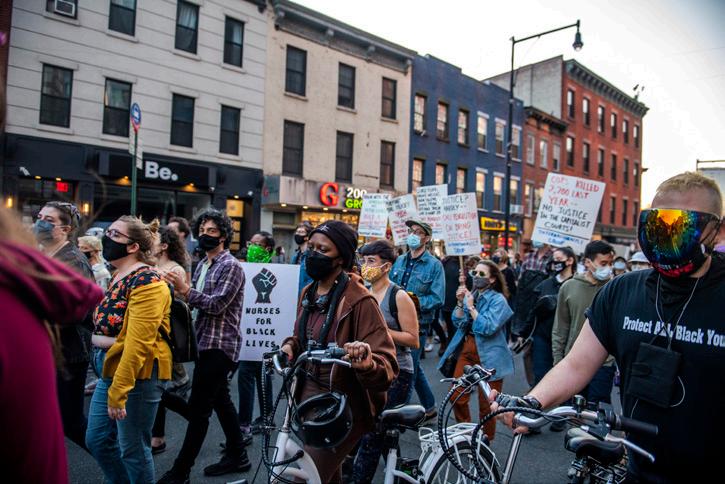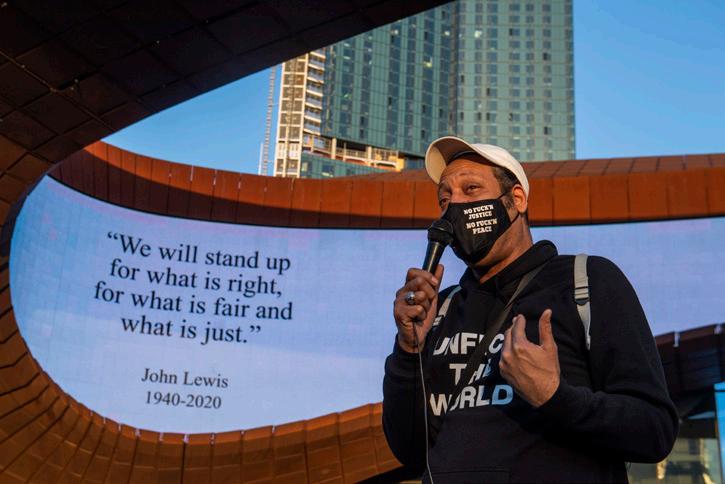
4 minute read
“NO JUSTICE, NO PIECE”
from Munkey Biz Issue 18
by HAPPY MUNKEY
BY: KENNY MACK
For 50 years, police used cannabis prohibition to unfairly target poor communities of color, leading to the mass-incarceration of hundreds of millions of Black and Brown Americans and perpetuating systemic racism and white supremacy. At the same time, cannabis culture pioneers facing life-and death consequences created and maintained an industry that is estimated to generate $65 billion annually in the United States. I am one of those pioneers.
Advertisement
I sold my first herb as a 13-year-old freshman at Weston High School in suburban Boston, and I launched my first cannabis enterprise as an 18-year-old freshman at Northeastern University. I never got a bachelor’s degree, though I definitely got an education; and I never went to business school, I just went straight into business. I’ve lived in Boston, New York City, the Bay Area, and Los Angeles County doing jobs ranging from a real estate agent, to stand-up comedian, to newspaper columnist. But no matter where I lived or what kind work I was involved in, the one constant in my life has been cannabis commerce. I have sold herb to just about everyone, just about everywhere, in just about every type of situation –– including as a dispensary operator in Venice, California, where I learned the regulated industry from seed-to-sale.
For the last few years I have been meeting with advocates, C-suite executives, legislators, and regulators to get ready to do business in New York. Knowing the devastation that cannabis prohibition has caused in my adopted home, and the economic opportunities available here in the world’s largest cannabis marketplace, it gives me no pleasure to report that the “War on Drugs” did not end with –– and no meaningful equity was achieved by –– the recent passage of the Marijuana Regulation and Taxation Act. That’s no shade at the super-smart and committed professionals who have worked on this for years and whose hearts are most certainly in the right place. It’s more of an acknowledgement that the kind of people who build careers as legislators and regulators shouldn’t be expected to know the ins-and-outs of the herb game, and that there is a lot more work to do when writing the rules of the road.
Estimates are that legal cannabis sales were only about 15% of the combined nationwide total in 2019. Those market dynamics are unsustainable; and recognizing that fact presents the opportunity to create a new kind of public-private partnership between government, industry, and the legacy entrepreneurs who control the other 85%. Governments around the country, who are almost all bringing in less tax revenue, could benefit from increased legal cannabis sales. Licensed operators around the country, who are almost all losing money, could benefit from bringing expertise and new sources of revenue into their companies. And legacy entrepreneurs, who are almost all motivated to create generational wealth, could benefit from converting their books of business into taxable income. What’s missing is the acceptance of the reality that legacy entrepreneurs hold the leverage in these negotiations, and the connective tissue to bring the parties together.
In order to accelerate and facilitate this legacy-to-legal transition for future cannabis business owners and workers, we at Restore The Harm, Inc. have launched our membership organization “National Cannabis United” at www. MakeCannabisWork.org with a commitment to help create and maintain an industry standard that honors cannabis culture. We believe that legalization efforts must include amnesty for legacy entrepreneurs, priority license access, day-one equity, and pathways to middle-class careers.
National Cannabis United understands that incentivizing legacy entrepreneurs to embrace the regulated supply chain is the key to ensuring an equitable, profitable, and sustainable industry. So to help our members get prepared, we work with them to develop Individual Management Planning And Career Training (IMPACT) outlines that include professional certification, tools for valuation, application preparation assistance, and referrals for attorneys, accountants, and underwriters. NCU is growing a diverse and impressive roster of legacy entrepreneurs who will happily enter into a contractual agreement to bring their expertise –– and tens of thousands of customers –– into a licensed operation in exchange for fair market value. Right now.
The alternative to fair and equitable partnerships between licensed operators and legacy entrepreneurs is to maintain the industry status quo of companies losing money with no realistic path to profitability. Corporate cannabis will continue to execute its two-pronged strategy to grow market share by 1) using its power and influence over lawmakers to create a highly-regulated market that marginalizes legacy entrepreneurs, and 2) using its power and influence over media and marketing to convert “fearful rejecters” into “curious intenders” and then “frequent legal consumers.” Meanwhile, the legacy market will just keep on rolling. It’s an approach that can only lead to the re-criminalization of the legacy space using the need for tax revenue as justification, which essentially defeats the purpose of legalization.
It doesn’t have to play out that way. We strongly encourage anyone who believes in this culture and wants to see legacy entrepreneurs succeed to get involved by visiting our website, and becoming part of the movement to prevent re-criminalization and Make Cannabis Work. We need your love, we need your energy, and we need your lived experience. All are welcome.
The struggle continues...
Photos by Brittainy Newman











